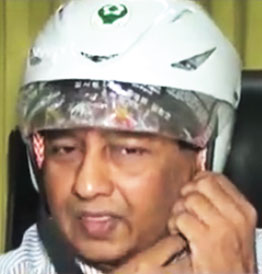|
Ban on helmets without SLS certificate :
Stop gambling with lives
by Maneshka Borham
In the light of the gradually rising numbers of fatal crashes
involving motorcycles, the Consumer Affairs Authority (CAA) at the
request of the National Road Safety Council (NRSC) will implement a ban
on the sale of helmets that have not received the Sri Lanka Standards (SLS)
certification from the Sri Lanka Standards Institute (SLSI).
 |
|
SLS-approved helmet |
The directive issued by the CAA under the powers vested in it through
Section 12 (2) of the Consumer Affairs Authority Act No. 9 of 2003 will
therefore from that date ban manufacturers and importers as well as
distributors of helmets from manufacturing, importing or selling
protective helmets without the SLS certification mark.
In recent times, while accidents overall have seen a slight decrease
compared to previous years, accidents related to motorcycles have seen a
steady rise and caused the highest number of fatalities. According to
the Police, 1,568 accidents occurred between January 1 and July 31 this
year and 1,632 persons have died. Of the accidents reported 666 are
motorcycle related, where 686 motorcyclists have died.
A majority of those who die from these accidents are youth, which is
a great loss to the country, says Chairman of the NRSC Dr. Sisira
Kodagoda adding that research studies have revealed that wearing helmets
that do not adhere to quality standards leads to severe damage to the
skull in an accident thereby causing debilitating injuries or death.
Therefore, it has prompted the Government to ensure that all helmets
available for sale should adhere to proper safety standards. Helmets of
lower quality cause more harm than good, as are found commonly in the
Sri Lankan market, he said.
According to the Traffic Police, riders have always been advised by
them to purchase helmets with the SLS certification, in the absence of
which, strong and durable helmets, fully covering the back of the
rider's head with a chin strap over 20 millimeters in length with a lock
for better safety, is the alternative.
However, Dr. Kodagoda claims, currently no SLS certified helmets are
available in the market although the SLSI had given a period of one year
for helmet importers to receive SLS certification.
Speaking to the Sunday Observer, SLSI Director General Gamini
Dharmawardena agrees. "The response has been very poor," he said adding
that only a few importers have currently applied for the SLS
certification despite the impending ban from September 1. According to
Dharmawardena the most lukewarm response received has been from local
manufacturers. "Not many of them have applied yet," he said, adding that
SLS 517 specifies the requirements for helmets. The SLSI has been
testing imported helmets while shockingly, no checks have been done on
locally manufactured helmets.
"The SLSI, to ensure that good quality products enter the Sri Lankan
market, through the years has been conducting a special Import
Inspection Scheme for 123 items," Dharmawardena said, adding that
helmets too were checked under this scheme. According to him when a
shipment of helmets arrives in the country the SLSI is informed by the
Customs officials. "We then send a team to collect samples and check the
helmets for their quality, and an approval letter is then provided to
release the shipment if the items conform to the required standard," he
said.
A local motorcycle helmet importer who wished to remain anonymous,
however, claims the new ban on helmets sans the SLS certification is
unfair on importers, although commending the effort to ensure that only
good quality helmets of a particular standard enters the Sri Lankan
market. However, the new ban is an undue burden on him and other
importers, he says.
Meanwhile, the Ceylon Motorcyclists' Association while commending the
new move claims better awareness and education must be given to riders
on how to purchase a helmet of good quality. According to the Secretary
of the Association Chirantha Amarasinghe his organization is saddened
that the Government continues to ignore the safety provided by full face
helmets. "We wish the government would encourage people to wear full
face helmets as they provide better safety," he said. As a previously
enforced ban on full-face helmets has been legally challenged, riders
are still free to wear full face helmets until the court case is
resolved.
According to the Police, despite the ban on the sale of non-SLSI
certified helmets, there is no law to ensure that riders only wear SLS
certified helmets. "We can only instruct and advise them to do so, and
are unable to take action against those who choose to wear helmets of
lower quality despite the serious risks," said a source from the Traffic
Police.
Also while helmets can provide protection and reduce fatalities,
viewing CCTV footage of accidents, it is clear that speed, lack of
awareness on road rules and sheer lack of care has contributed to the
rising numbers of accidents. While this is a welcome step to keep riders
safe, more needs to be done to prevent and reduce the number of
accidents involving motorcycles in Sri Lanka. |

